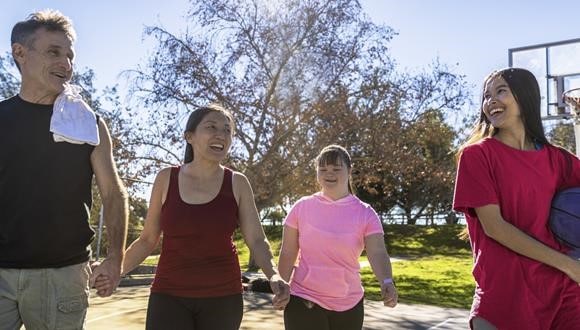Incidental activity: focus on movement instead of exercise
Updated February 2023 | 3 min read
Expert contributor Libby Babet, personal trainer
Words by Libby Babet
Incidental activity is a movement mindset may help you achieve your fitness goals.
What’s the first thing that pops into your head when you hear the word ‘exercise’? If ‘too hard’ is up there at the top of the list, you’re not alone. Incidental activity or incidental exercise can help improve your physical fitness without having to join a gym. Research suggests incidental activity has many benefits, especially for people who can’t get enough exercise. Incidental physical activity is movement built up in small amounts over the day. This could mean taking the stairs instead of the lift or taking a walk instead of driving your car.
According to a study by the University of Georgia, consistency is the key when it comes to fitness. The study showed that moving your body on a regular basis long term increases your energy levels and reduces fatigue.
And one way to create consistency for people who aren’t exercise-lovers is to ditch the word ‘exercise’ and use ‘movement’ instead.

Change your mindset
While exercise can seem intimidating and hard, movement is a gentler term and is more about your lifestyle.
Instead of conjuring up images of sweaty gyms and tough runs – all of which you have to make extra time for – creating a culture of movement can mean anything from an evening stretch, getting up for a walk in the middle of a hectic work day or cycling to work. It’s about Sunday strolls in nature and family games in the park.
Simply reframing health and fitness from something you ‘should’ do to something you ‘want’ to do is an incredibly powerful mental act. Creating a movement culture is a mindset and a way of life, not a short-term goal. It’s also one of the best preventive medicines.
The benefits of physical activity for women
Research suggests that physical activity can affect hormone level production and women with lower levels of estrogen are more likely to be sedentary. Sedentary lifestyles are associated with health risks like heart disease, diabetes, osteoporosis and certain cancers. For both older men and women, research suggests that incidental physical activity can be protective against age-related deterioration.
Workouts for when you don't want to workout
- Take an evening walk: Instead of watching TV after dinner, head out for a walk with a friend or family member. It doesn’t matter if it’s 15 or 45 minutes, it’s about creating a habit that brings you together and stops you moving straight from the table to the couch.
- Stretch on the couch rather than eating on it: If an evening walk is out of the question, sit on the edge of your couch and stretch, which could help to improve your flexibility and posture. If you sit at a computer for long periods of time, try The University of the Sunshine Coast’s stretches for office workers.
- Have a workout ‘snack’: A workout snack is a bite-sized activity you can fit into your day easily. Go for a few laps around the block to wake up your brain, skip with a rope for 5 minutes before dinner or choose two exercises to do every morning – like a push-up and a squat – then do 10 repetitions of each of them, increasing the number over time as you become used to doing them.
- Move your meetings: Research suggests that healthy employees are more productive employees. So, if you have a sedentary job, instead of sitting down for meeting after meeting, every now and again take a teammate for a ‘walking meeting’ – hit the road and talk it out. You’ll both appreciate the mindset and perspective shift a walk gives you.
- Become a podcast pedestrian: Find a podcast on nutrition, fitness or any other topic you’re interested in. Then listen to an episode while you take a walk or cycle on a bike in the gym, or even while you clean the house or wash the car. It’s health education on your own terms. Popular podcasts include Radio Headspace, TEDTalks Health, HCF's Navigating Parenthood and ABC’s Health Report. If you’re listening on the go, remember to stay aware of your surroundings to avoid accidents.
Related articles
3 ways to prevent osteoporosis
Here are simple tips to reduce your risk factor for osteoporosis and keep your bones strong for life.
What are hormones?
What are hormones, why are they important and how do they impact your body? Learn about how hormones help to keep you fit and well.
Can gardening reduce your stress levels?
Having a green thumb can benefit your mental and physical health.
How Cheryl got a new lease on life
During a visit to an HCF branch, Cheryl Read discovered Healthy Weight for Life.